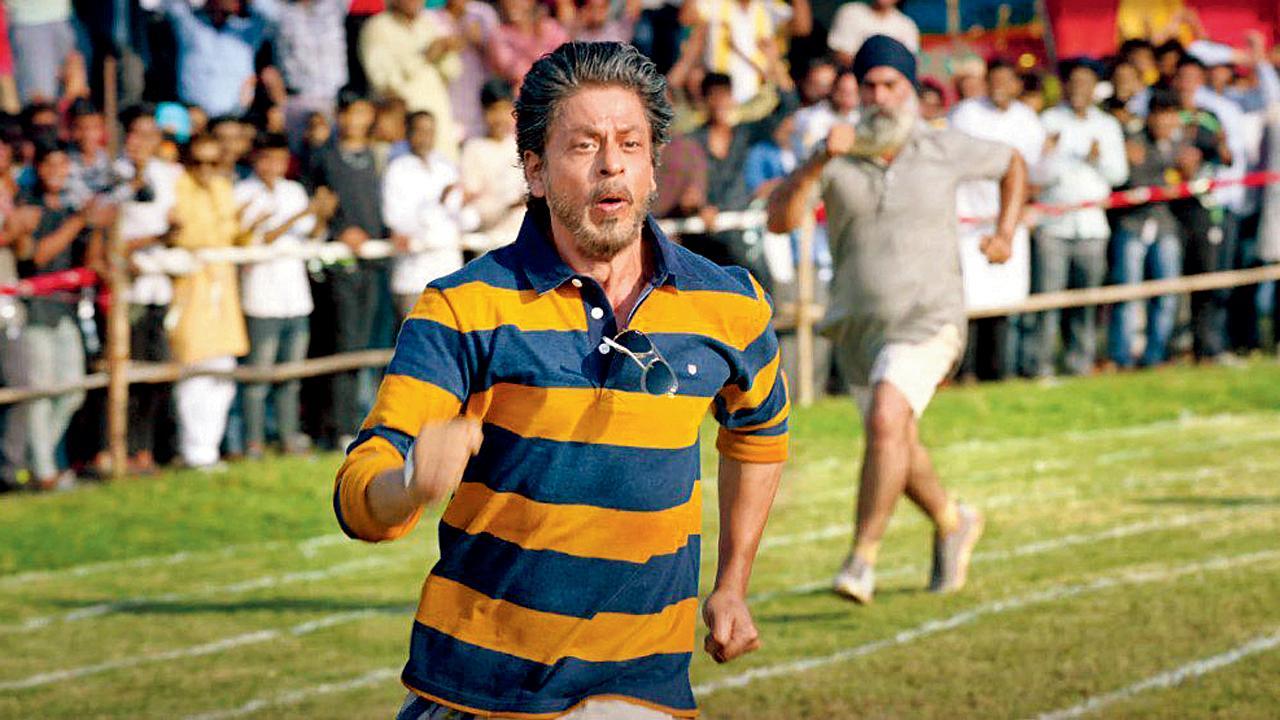Shah Rukh Khan used to run 100 metres in 12 seconds; the record for an Indian is 10 seconds-Melwyn Crasto
8:18 AM
Posted by Fenil Seta

With Dunki, athletics coach Melwyn Crasto adds another achievement to his resume—he has now trained all three ruling Khans of the film industry. In this interview, he chronicles addressing different cinematic needs
Sonia Lulla (MID-DAY; January 3, 2024)
Called on by director Rajkumar Hirani to train Shah Rukh Khan and Dunki’s supporting actors for a running sequence, athletics coach Melwyn Crasto found relief in the fact that the actor did not need to appear technically sound.
“He had to participate in a 400-metre sprint, and I was told that he did not need to have the precise form. All the runners were around 50 to 55 years old. And while we had access to a running track, the scene was set in a Punjab village, amid a mela, where, along with the stalls, [an area] for games was present. It was a muddy and stony track that they had to run on.”
Introduced to Khan as the man who would choreograph the sequence and train him for the part, Crasto recalls the actor’s first reaction. “He told me that he was a good sportsman when he was in school, and that he used to run [100 metres in] 12 seconds, and was the champion for about six years. I was impressed, because not many can pull off a race in such a short interval. The record for a 100-metre sprint by an Indian is, after all, 10 seconds,” he says, making a case for Khan’s athletic levels while revealing that he’d pull off “race after race” while filming the part.
In Khan’s regimen, his warm-up routine was non-negotiable. “Because he was set to sprint, and wasn’t pulling off a slow, endurance run, the warm-up was crucial to preventing injuries. These entailed stretches for the hamstrings, and the other muscles of the legs and shoulders. Subsequently, I’d train him in running techniques, such as how he needed to use his hands. I told him how to overtake other runners, as was needed in the scene, and how to navigate a turn and run around the curve.”
Not one to be easily impressed by his Bollywood clients, Crasto doesn’t hold back when heaping praise on Hrithik Roshan.
“He has a fantastic body that is [suited for] athletics. He had initially approached me to train his sons, and subsequently wanted me to train him as well, for general fitness. Athleticism involves learning how to sprint, throw and jump, apart from running. I call it the mother of all games because if you want to be an athlete, you need to learn athletics. [Ideally], you can start training at the age of eight. So, our association began with training sessions for his boys. When he saw the things I was doing with them, he said he wanted to do them too. He said that while he had been heading to the gym, he wanted to [train differently]. We began with basic running drills, like high knees, back kicks and running lunges, and he would immediately grasp them. After six months of training, his body began to look like that of an athlete, not a body-builder. Of course, owing to his knee [injury] and back issues, I couldn’t give him many jumping movements, but he could do the agility drills, and could also sprint very well.”
Preparing for the long jump
Roped in to train Vicky Kaushal to pull off action sequences in Sam Bahadur, Crasto recalls teaching him to execute a high-jump in the film. “It is a highly technical move because one needs to jump between two vertical stands. An athlete is given only about two metres of space to pull it off, which is what makes this technical. We had four months to train for it.”
After ascertaining that Kaushal’s “basic fitness levels” were retained, Crasto trained him in a variety of drills. “We executed standing jumps, broad jumps and a variety of exercises in circuit training. He was taught to shift his body weight, because pulling off a vertical jump requires immense strength and power. So, we executed plyometric drills. We also had to work on strengthening his core and practiced eight different exercises to do that. If one isn’t fit enough to carry his weight, attempting this jump can be risky. Finally, we moved on to agility and mobility work, so that he could [use the momentum] from his run-up for his jump. Translating the run into the jump is also a technical move that needs explosive power,” shares Crasto, adding that Kaushal nabbed his first jump in three months.
Crasto, the athletic coach for Central Railway, expresses his gratitude towards them for “letting me pursue these projects”.

This entry was posted on October 4, 2009 at 12:14 pm, and is filed under
Dunki,
Hrithik Roshan,
Interviews,
Melwyn Crasto,
Melwyn Crasto interview,
Shah Rukh Khan
. Follow any responses to this post through RSS. You can leave a response, or trackback from your own site.
Subscribe to:
Post Comments (Atom)
Post a Comment